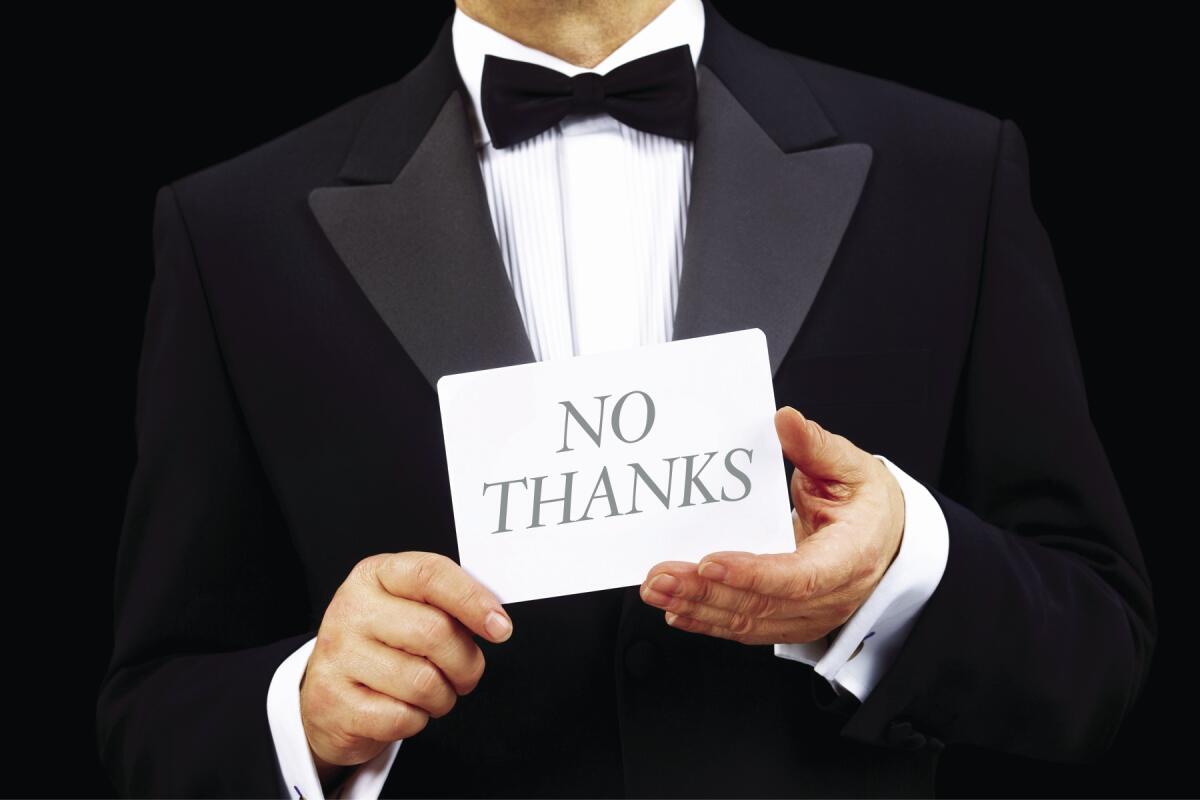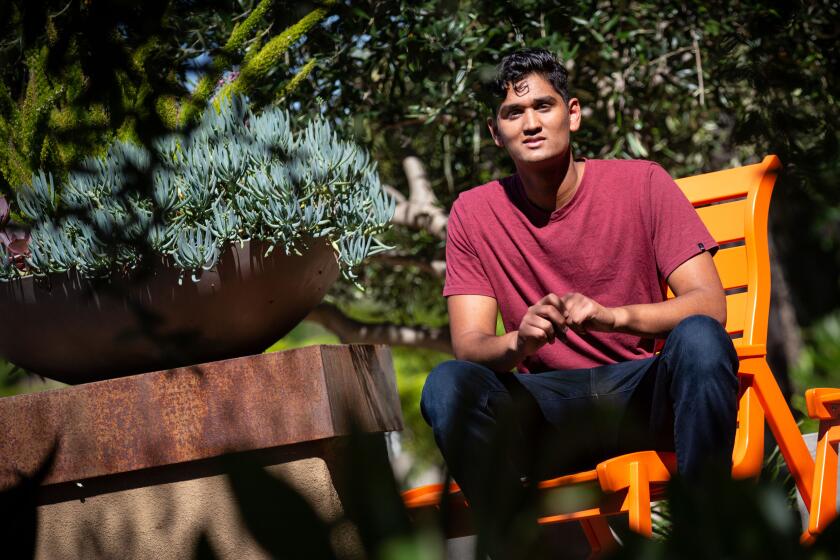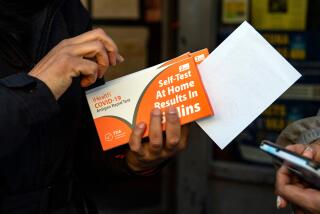Your friend is throwing a party during a pandemic. How do you say no?

- Share via
In a year without a Great Plague, we’d be in peak wedding season right about now. Unfortunately, passed appetizers and champagne toasts have largely been relegated to the same nostalgic category as spin classes and shared office doughnuts.
Per the most recent set of guidelines issued by the L.A. County Department of Public Health, “individual and family gatherings or parties of any size aren’t allowed.” But, whether advisable or not, some people are beginning to plan parties and weddings again. Which leaves potential guests wondering: How do I say no? Can I say no? What if I already RSVP’d? How do I phrase it without sounding judgmental?
If you don’t care at all about the person who’s asking you, saying no is easy: Say “no.” But assuming this is someone with whom you’d like to continue a relationship once the pandemic is over, it can be a little trickier. We turned to some experts for guidance.
Get The Wild newsletter.
The essential weekly guide to enjoying the outdoors in Southern California. Insider tips on the best of our beaches, trails, parks, deserts, forests and mountains.
You may occasionally receive promotional content from the Los Angeles Times.
How to say no politely
Of course you are allowed to say no. You are allowed to say that at all times, to all invitations, under all circumstances. But especially right now, in the middle of a pandemic.
So it’s less about whether you can say it and more about how, experts say. Tone matters. Put a smile on your face when you make the call and keep it simple: “Thank you for the invitation, I’m so sorry but I can’t make it.”
You don’t need to explain why or start adding qualifiers or caveats. That’s where you run the risk of veering into judgmental territory.
In our Plant PPL series, we interview people of color in the plant world, including plantfluencers, plant stylists, floral artists, enthusiasts, experts and garden store owners.
“Your sole purpose is to accept or decline an invitation. We’re taking on too much with the feeling that we need to go into detail and explain,” said Elaine Swann, a lifestyle and etiquette expert and the founder of the Swann School of Protocol in Carlsbad, Calif. “Don’t go into detail and say, ‘I’m not attending anything.’ I think that’s where you open yourself up for conversation and scrutiny and debate.”
But what if I’ve already RSVP’d?
Even if it’s something you’ve already RSVP’d to, like a wedding, you can still go back to the host and decline. It isn’t rude to change your mind about going to an event where your attendance could be risking your life. What would be rude would be to wait until the last minute to do so: As soon as you know you won’t be going, get in touch with the hosts and tell them. Give them time to adjust their seating charts and catering orders.
When conveying the message, again, graciousness and simplicity are key: “I wanted to update you about my RSVP for your wedding. Thank you so much for inviting me, but unfortunately I won’t be able to make it.”
Everyone has an opinion about the value of taking a gap year after high school or during college. For those who do so, it can be a chance for an adventure as well as an opportunity to grow and mature.
You can still send a gift
Just because you can’t go to an event doesn’t mean you can’t be appreciative toward the host. If it’s a milestone birthday or a wedding, send a card and a gift. If it’s a more casual get-together, have flowers delivered or send the hosts some money ahead of time with a note: “So sorry I can’t be there. Dessert’s on me!” Reach out to the hosts again the day after the party and tell them you wish you could have attended and you can’t wait to see the photos.
You can also offer alternatives to getting together on that day: Plan a time to sing “Happy Birthday” on video chat the day before or offer to drop off dinner at their house later that week.
If you do decline an event, be consistent. It would be extremely poor manners to post photos of yourself a week later throwing a barbecue or having a pool party.
The age of social distancing is surprisingly social. Party ideas, pointers and more to make your next Zoom your best yet.
Inquiring about social distancing
Everyone’s personal risk assessment is different right now. Maybe you’d feel comfortable going to a backyard barbecue, but only if everyone will be wearing masks and staying six feet apart. In this uncharted etiquette territory, is it OK to ask the hosts if they’ll be doing double duty as social distancing enforcer?
“Generally, no,” said Jules Hirst, an etiquette coach based in Los Angeles and the co-author of the book “The Power of Civility.” It depends on your relationship with the host, she said. If it’s a family member or someone you’re close to, it’s more acceptable to inquire. You could also use their past behavior for reference: If they’ve posted a bunch of photos of themselves in crowded public areas or at other parties with no mask on, it’s reasonable to assume they won’t be strict about things at their own house.
If you do ask, phrasing it as a yes-or-no question will probably yield more useful information than broadly asking about social distancing, since not everyone has quite the same understanding of what “good social distancing” looks like. Will you be asking people to wear masks? Will families be seated at least six feet away from each other?
Get comfortable with being uncomfortable
To be clear: These are awkward questions. It’s kind of like asking another parent if they have a gun in their home before sending your child over to play. No matter what the answer is, there’s a chance you’ll have offended the person by asking at all. But the stakes are similarly high.
“We are dealing with a worldwide pandemic and this is what our current state of affairs looks like. It’s really important for us to be mindful in that regard and be bold and empowered enough to ask those hard questions,” Swann said. “Right now you’re doing your part for the health of yourself and your loved ones.”
When social distancing gets overly social
You’ve been reassured that masks will be on and distance will be maintained. But after a couple of hours (and a couple of cocktails), you notice social distancing and masks starting to slip. That is your cue to exit.
Don’t ascend your soapbox and deliver a speech about why you’re leaving, as satisfying as it might feel in the moment. And don’t go tattling to the host.
If you’ve reached the point when other guests’ behavior is making you uncomfortable, “it’s probably best to go over and thank the host for inviting you and say you had a wonderful time but you have to get going,” said Jessica Marventano, co-founder of the etiquette website Marvelously Well-Mannered. “I wouldn’t say to someone in the middle of the party that they’re having, ‘Oh, you know the people in the corner are taking off their masks,’ because then you’re saying the host isn’t doing their job and you’re taking away their joy of hosting the party.”
If you know ahead of time that certain guests are probably going to ignore social distancing protocols, no matter how much the host says they’ll be enforcing things, it’s better to not go at all. In other words: If Uncle Kevin who posts daily anti-mask rants on Facebook is going to be there, skip it, even if your cousin swears she’ll make everyone wear the cute matching family reunion masks she ordered.
Defusing difficult conversations
In most cases, when you’re saying “thanks, but no thanks” or making a hasty departure, the host will understand. But not always. How do you deal with friends or family members who think you’re an elitist or a sheep or a fool for taking basic health precautions? How do you change their mind and make them realize how serious this is?
Basically, you don’t. “No” is a complete sentence; “Thank you, but no” is as well. It isn’t your responsibility to convince everyone in your life that you’re right and they’re wrong.
“Our goal is not to try to correct anyone or chastise them or even educate them,” Swann said. “We should not take on the task of trying to correct or fix other people. The only thing we can do is correct ourselves.”
Some minds can’t be changed
Even knowing someone firsthand who’s been affected isn’t always enough to persuade people to take it seriously. Hirst said her cousin died of COVID-19 after attending a gathering. Later, at her niece’s drive-through birthday party, she was shocked to see other guests coming out of the backyard.
“I said to my sister, ‘How could you? Tommy went to a barbecue and died two weeks later. How can you do this? We know somebody; this is personal now.’”
Hirst compared the social distancing issue to politics: At a certain point, you have to agree to disagree and just change the subject. At this point, everyone is aware of the coronavirus, and everyone has formed their own opinion about it. You’re unlikely to change someone’s mind with articles and graphics and well-reasoned arguments, so don’t bother.
“You just can’t change people’s minds. You can’t. That’s it.”
Politeness still matters
And on the other side of the debate, some people reading this might be wondering why we should care about etiquette at all in these situations. Doesn’t a pandemic take precedence over politeness? Yes — but that doesn’t mean manners are now irrelevant.
“Whatever the CDC and government officials are telling us, these are guidelines to keep us alive and keep us healthy,” Hirst said. “Manners are a guideline so you still have friends when this is over.”
More to Read
Sign up for The Wild
We’ll help you find the best places to hike, bike and run, as well as the perfect silent spots for meditation and yoga.
You may occasionally receive promotional content from the Los Angeles Times.














